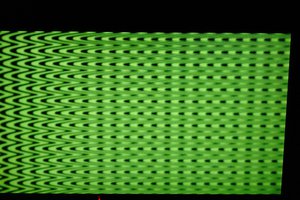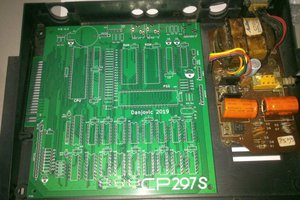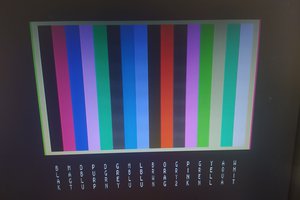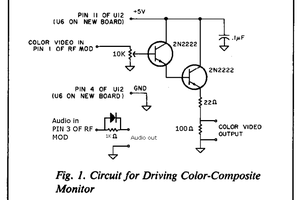See logs section below for blog entry. Not using things as designed is the spirit here, Hackaday.io included!
DarthCloud's Retro Gaming Room
A blog about retro gaming mods
A blog about retro gaming mods
To make the experience fit your profile, pick a username and tell us what interests you.
We found and based on your interests.
See logs section below for blog entry. Not using things as designed is the spirit here, Hackaday.io included!
jvc.pdfAdobe Portable Document Format - 26.80 kB - 04/09/2020 at 12:02 |
|
|
SEGA made several revision of the MD/Gen board (9 for model 1, 7 for model 2) and each of then affect the AV output in different way. On top of that the Sega CD and 32X add-ons add their own audio and video.
I will document here my experience with my own Model 2 VA0.
The cartridge port audio (2) [32X] get first mix with the system main audio (1), this is sent to the expansion port audio output (3) [Sega CD]. Then the expansion port audio is mixed in (4) [Sega CD] and everything is output on the Mini-Din 9 AV port (5). A last stage also mix the 2 audio channels for the mono output (6) also available on the AV out. The 32X simply passthrough the audio outputs from the main system AV out to it's own AV out.
RGBS 5Vpp video from the VDP (1) goes to the video encoder which drive the CVBS and RGB on the AV out (2). An important note is that the RGB line are missing the 75Ω and 220uF capacitor which need to be added in the cable (more on that later). Also the CSYNC output is from the VDP directly (3). It's an open drain output that is not advised to use for cable without a proper driving circuit.
The 32X use video compositing with alpha channel which allow to superpose the main system VDP analog output (4) with it's own video output (5) (either below or over). Using a straight cable connection between main system AV out and it's own AV input it use the RGB and CSYNC lines (6). The composited video is output the same way as the main system with missing component on the RGB channel (7). The CSYNC is passthrough to the 32X AV out.
This is often result of bad cable construction. I had a cheap cable from ebay with that problem. RGB lines 75Ω resistor were placed at the SCART connector end, TTL CSYNC and no individual shield for each line. This caused parasitic capacitance from Video to go onto the audio create the buzzing sound.
Solution would be to make sure the resistor are place inside the Mini-DIN 9 plug on console end and using cable in which each signal is shielded individually.
For my setup I made a small Mini-DIN 9 to DE15/TRS to be able to use regular cable.
I haven't seen this one mention online other than MD/Gen got a bad sync. On my newest Extron RGB 203 (w/ EDID) sync processor I see the Vertical frequency detected as 175Hz!! That look close to the 60Hz 3rd harmonic. My older RGB 203 don't see the sync at all! Maybe a notch filter would help. XRGB3, XRGB-mini & TV handle the sync fine however. This still need to be investigated...
The jailbar come from interference from the chroma subcarrier as the pcb trace are close to the RGB output trace. If you don't need functional composite video you could just lift pin 6 of the video encoder to resolve this issue.
Another solution is to perform an RGB bypass mod were the RGB is taken directly from the VDP output as pass through an THS7374 video amp. See Triple-Bypass mod below.
Later revision don't quite sound like the original one. Their is 3 category of MD/Gen when it come to audio.
Fixes for audio evolved over the years.
First you had the Crystal Clear Audio Mod by Tiido in 2009 that specific for model using the ASIC YM3438.
Then the MEGA AMP by Ace in 2014 for all version. Followed by MEGA AMP 2.0 update in 2017.
The Triple-Bypass mod by db-electronics merge together the mega amp 2.0 with the RGB bypass mod.
The Triple-Bypass V2 mod by TianFeng offer a solution for all model revision with one PCB and fine tune the audio to be as close as possible to what a VA3 model 1 would output.
Let mod now! Doing...
Read more »The excellent Ars Technica episode on Prince of Persia made me want to play the original one. I only ever played the excellent SNES version (would be call a remake by today standard). But the original one look to have a special vibe to it.
A couple month back, I got hold of a PAL Amiga CD32 machine for my collection. Looking at online feedback it look like the Amiga port is faithful to the original Apple ][ version. Should be easy enough to play it on my CD32 right?
The first thing to address is that I got a PAL CD32 and no display that support PAL/50Hz/288p (in Canada here). Why not getting an NTSC system in the first place? The CD32 never saw an official NTSC release (maybe a very limited one in Canada), NTSC system in the wild come from warehouse stock for that launch that never took place. So there is almost no NTSC software! While some PAL software will play nice with the NTSC version many will not. It's possible to toggle between 50hz/60Hz mode at boot or via a jumper on the board. From my understanding a PAL CD32 switched to 60Hz has better compatibility (but not 100%) than an stock NTSC system since the CPU is still running at the PAL speed of 28.37516 MHz rather than NTSC speed of 28.63636MHz.
In sum you got 3 main difference between PAL & NTSC system:
With 50hz/60Hz switch we only change one of those 3. At that point as an NTSC TV user you will be lucky to see a B&W picture with the bottom of the screen cropped if using a PAL software. This is because the color encoding is still PAL and the resolution is 288p not 240p!
You could also see a rolling screen, as some PAL software don't care about the 50hz/60hz setting and will output 50Hz no matter what.
How do we get color? We simply workaround the PAL/NTSC encoding stuff and mod the console for RGB output! The CD32 got a quite standard video encoder chip the CXA1145. We can use it to drive 75ohm RGBS output by completing the four circuit with a 75ohm resistor and a 220uf capacitor.
The hole in the case for the RF modulator suspiciously got a DE dsub connector size. Removing the RF modulator (some ChipQuick will help) will make place to add a VGA (DE-15) connector. I placed it between the plastic case and the RF shield to add some pushing & pulling resistance.
Look to be straight from factory!
Awesome color as expected from RGB!
Now all we need is a copy of PoP for the CD32, no official release exist so we have to use a tool called whdload on a CD image to launch the original version that you already legally own. Lucky for us, some nice people on the internet already made that work and provide unoffical CD32 port for the game (Don't ask me). Unfortunately, you wont find NTSC version of those port since the CD32 userbase is mostly in PAL land. So with those port the bottom of the screen will be cropped on our NTSC TV. In this example the life bar is missing at the bottom with giant black bar at the top. Playing with the TV vertical centering wont help.
Best bet is to get a NTSC version of PoP for whdload that is target for use on Amiga computer and inject it in the existing CD32 port image.
I found a nice tools on github to help edit CD32 image: https://github.com/patrikaxelsson/cd32tools .
git clone https://github.com/patrikaxelsson/cd32tools.git
7z x -opop_cd32 prince_of_persia_cd32_pal.iso
cp PrinceOfPersiaNTSC/Disk.1 pop_cd32/
cp PrinceOfPersiaNTSC/prince.high pop_cd32/
cp PrinceOfPersiaNTSC/PrinceOfPersia.slave pop_cd32/
mkisofs -quiet -V POPCD32NTSC -copyright na -publisher na -o pop_cd32_ntsc.raw -relaxed-filenames -d -input-charset ASCII -output-charset ASCII -iso-level 3 -A "" -sysid CDTV pop_cd32
python2 cd32tools/iso/make_cd32_iso.py -t cd32_developerkit/ISO9660Tools_V1.04/ISOCD/CD32.TM pop_cd32_ntsc.raw
...
Read more »
RGB modding CRT TV via OSD RGB input is quite popular nowadays thanks to good instruction available from the TV RGB mod thread @ shmups.system11.org.
I did attempt doing this a long time ago actually on my first TV a Deawoo!! But I didn't do any OSD mixing circuit, nor lift the OSD pins, nor terminate rgb input etc. I had no idea what I was doing back then. So the picture was really really dark. Original post from 2004. It was a good learning experience but nothing useful in the end. I end-up using XRGB3 and XRGB FM with plasma TV for year with my RGB systems.
A friend gave me a nice 32" JVC CRT and the first thing I had in mind was to do the RGB mod on it. So this mod is base on the OSD Mux RGB Mod by Syntax & MarkOZLAD over @ shmups.system11.org .
In this form the mod is targeted at SCART user, mostly in Europe. On my setup I'm using VGA (DE-15) connection for everything (YPbPr, S-Video & CVBS as well on the switch side) and 3.5mm TRS connector for audio. This allow me to use Extron MVX matrix switcher. The drawback from not using SCART is the lack of switching signal. So I need to add a switch to the TV for toggling between regular and RGB input.
Originally for the JVC I did the mods using the second AV input (VIDEO2). But then I didn't had a CVBS input anymore, only RGB, S-Video & RF. On this TV model the S-video input (VIDEO1) is actually shared with a CVBS input. Looking at the schematic we can see those two are actually independent output. The S-Video connector include a switch that is open when a S-Video plug is connected and close when it's empty. So normally when a S-Video cable is in it's not possible to use the CVBS input shared with it. Also only one audio input is share between the two. This is not a problem for me as I use Extron MVX matrix switcher which allow me to move audio independently from the video selection.
By adding a switch between pin 5 & 6 of the S-Video connector SW we can force the input to be the CVBS one. This is very handy for the RGB mod as we can use a DPDT switch to toggle both the CVBS input active for CSYNC and the OSD blanking line for overriding the picture input.
The result is gorgeous picture but the picture is a bit shift to the left. This can be fixed via the service menu of the TV: Adjust H POSITION in service menu -> Picture -> Option 16.
Alternatively an Extron sync processor (like RGB 203 Rxi) could be used to adjust the picture centering.
The OSD mixing is really good while using RGB input:
RGB on CRT is way better than via XRGB on a flat screen. The real deal :)
Create an account to leave a comment. Already have an account? Log In.
Divan beds are a fantastic choice for bedrooms seeking both functionality and style. They offer a solid base that ensures a comfortable sleep experience, complemented by integrated storage solutions like drawers or ottoman lifts, which are ideal for maximizing space in smaller bedrooms. I appreciate how divan beds can be customized with different fabrics and headboard designs, allowing you to create a cohesive look that enhances your bedroom's aesthetic. Whether you're looking to declutter with extra storage or simply want a bed that blends seamlessly into your decor, divan beds are a practical and stylish solution for any bedroom setting.
"Throughout the matches, participants take charge of their team's players, skillfully orchestrating a series of moves such as precise passes, strategic shots, and well-timed tackles. The objective is to secure goals while adeptly thwarting the opposing team's scoring endeavors. This dynamic gameplay mirrors the strategic finesse seen in various aspects of Japanese culture, where precision and coordination are highly valued. Just as in a well-choreographed performance, the players navigate the field with a sense of harmony and strategy, embodying the principles of teamwork deeply ingrained in both the sport and Japanese cultural ethos."
https://www.ejable.com/japan-corner/japanese-culture/japanese-culture-and-traditions/
Become a member to follow this project and never miss any updates


 danjovic
danjovic
 Leon
Leon
 Barry Nelson
Barry Nelson
DarthCloud's Retro Gaming Room is a nostalgic paradise, packed with classic consoles and vintage games. It's like racing a beach buggy Racing through time—fast, fun, and full of retro vibes at every turn. Click now.
https://beachbuggyracing.net/beach-buggy-racing-for-pc/